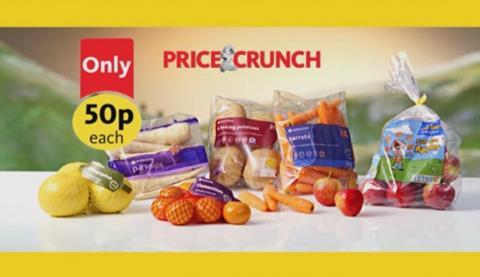
You may have noticed substantial discounts when shopping for fruit and vegetables at your local Asda and Morrisons stores in recent months.
With Morrisons selling cut-price 50p fresh produce as part of its Price Crunch promotion, and Asda recently committing to selling produce at low prices for a minimum of 12 weeks as part of its Price Lock initiative, fruit and vegetable bargains have been prominent in UK retailers since the turn of the year. But at a time when the fresh produce industry is still recovering from last year’s poor weather and its negative impact on crop volumes, are such discounts a help or
a hindrance?
“I strongly doubt suppliers are lining up with truck loads of surplus produce asking retailers to drop their prices; this seems to be a situation where the major retailers are striving to prove that in ‘tough times’ they are offering a better deal than their rivals,” says Nick Tapp, head of agribusiness
at Bidwells.
Tapp says he has been “baffled” by the recent discount push on fruit and vegetables at a time when supply is tight across the industry and input costs are continuing to rise for suppliers. Despite industry bodies such as the Potato Council calling for prices to rise to support growers recovering from one of the worst growing seasons on record, Morrisons sold packs of new potatoes for 50p throughout March. However, the retailer has stood by its decision to significantly discount its ranges of UK fruit and vegetables.
The Bradford-based supermarket explained: “We introduced a range of 50p promotions on our fruit and vegetables to encourage customers to buy fresh, healthy produce at a great price. We buy more of the produce we sell directly from growers than any other major supermarket and always aim to offer them a fair price.” Asda did not respond when asked for comment.
But not all vegetable suppliers share Morrisons’ assessment. One supplier to several of the UK’s major retailers told FPJ that he believes both retailers’ recent “questionable” financial performance (Morrisons recently announced a like-for-like sales drop of 2.1 per cent for 2012, while Asda’s grocery market share has remained stagnant in the last few months) has forced buyers into pressing for cheaper prices.
“I don’t feel any of the UK’s retailers are properly supporting their vegetable suppliers at the moment,” he says. “We are being pushed for low prices at a time when we need a bit of leeway and as a result I think you’ll see a lack of supply on all major vegetable crops into UK retail this year.”
Meanwhile, Charles Hughes of South Africa-based firm Tru-Cape Fruit Marketing, who says prices have been satisfactory for the country so far this season, admits that any more price reductions from UK retailers could prove terminal. “[Fears of] suppliers being put off supplying into the UK will be well founded if growers’ income is reduced any more, and especially if there are better alternatives elsewhere,”
warns Hughes.
Banana suppliers’ concerns over the price inelasticity of their products and fears of a permanent devaluation of the category are well documented, but suppliers in other categories have expressed similar concerns if 50p price levels are maintained for a long period.
The flip side is the argument that the promotions help drive volume sales at a time when national fruit and veg consumption is, at best, static. And Duncan Swift, a food industry specialist in corporate recovery at accountancy firm Moore Stephens, insists that the recent discounts are a “massive opportunity for growers to tap into”, and he believes fresh produce can stand out this year as cereal and cocoa prices are both expected to increase significantly.
He concludes: “I don’t think this promotional activity in itself is likely to devalue the category as there is presently a real opportunity to present fresh produce as a value-for-money and healthy alternative to other food categories
and confectionery.”



